Kalvos & Damian's Komposer Kombat 2005
Show #537, September 17, 2005
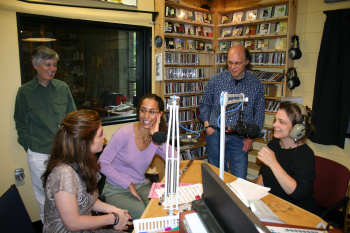
|
|
Peggy Madden and Damian (standing) with Lucy Yates, Amanda Baker and Mary Jane Leach in Studio A
|
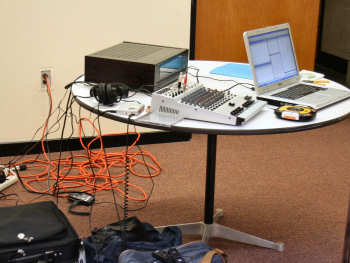
|
|
Electroacoustic listening central
|
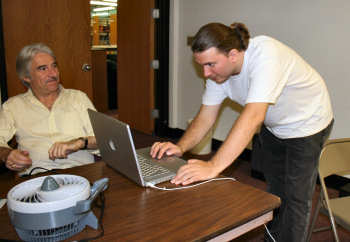
|
|
Rob Voisey performers "Bounce" live during electroacoustic round 2
|
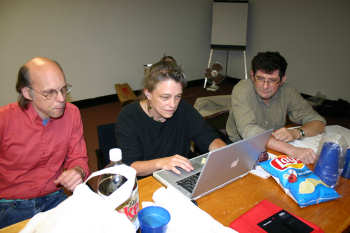
|
|
Damian, MJ Leach, and Robert Bonotto eat while judging cornflake electroacoustics at the end of round 1
|
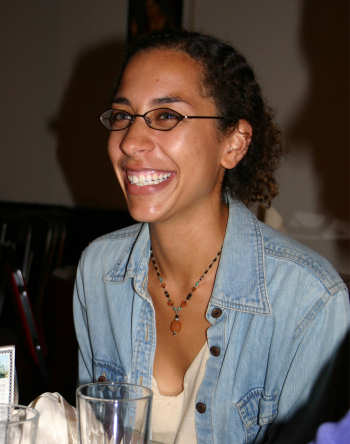
|
|
Flutist Amanda Baker of the Janus Trio
|
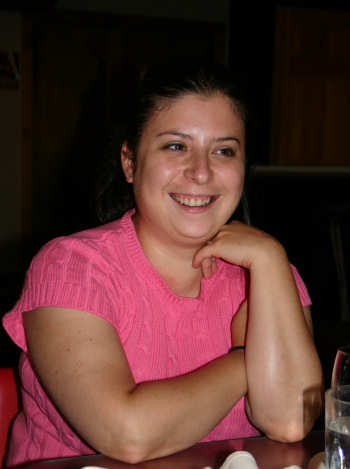
|
|
Oboist Carla Parodi at dinner with K&D
|
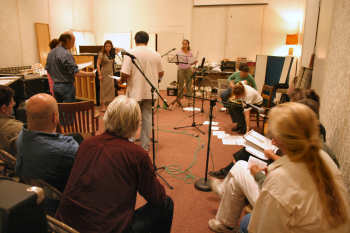
|
|
Setting up with performers and judges in Studio Z
|
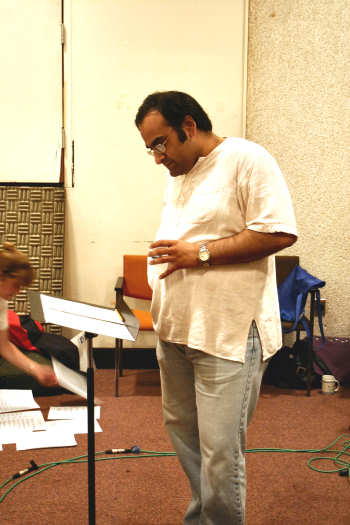
|
|
Ravi Rajan studies a score to conduct during the acoustic round
|
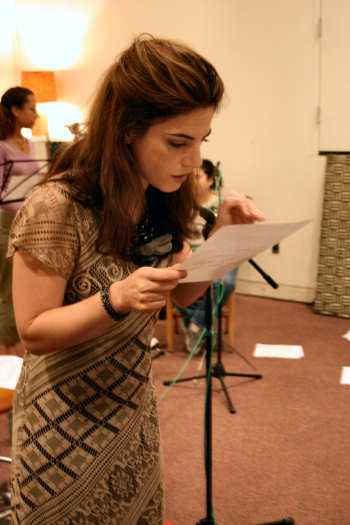
|
|
Lucy Yates is staggered by a composer's ineptitude
|
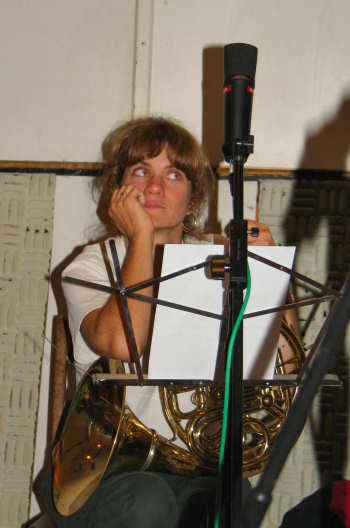
|
|
Lydia Busler-Blais awaits the cue that may never come
|
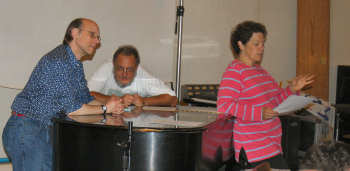
|
|
Kalvos and Damian wait for the music to become good for Lisa Jablow
|
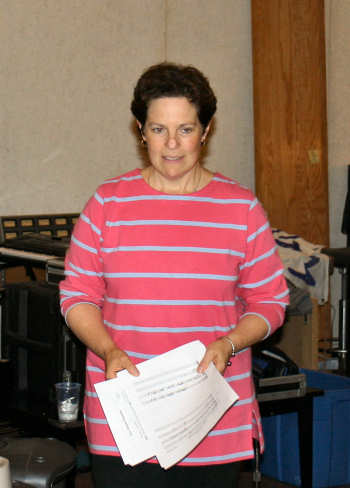
|
|
Lisa Jablow gets ready to dump the score in the pile
|
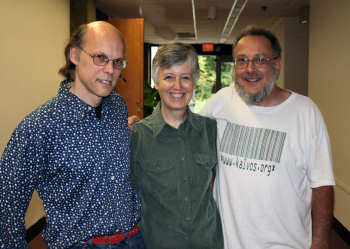
|
|
K&D with Peggy Madden
|
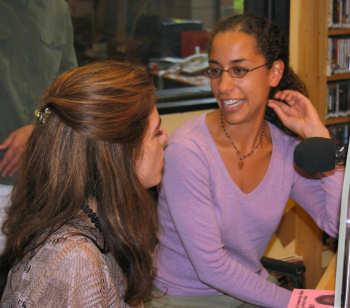
|
|
Lucy Yates (left) and Amanda Baker in Studio A
|
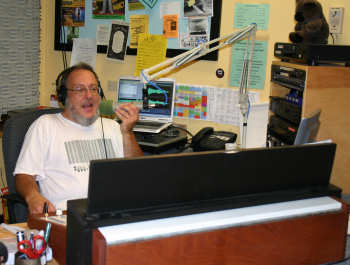
|
|
Kalvos (or is it Damian?) will never be a Don Imus
|
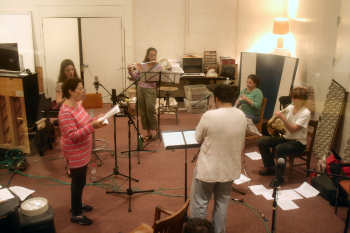
|
|
Performances in progress during the K&D show in Studio Z
|
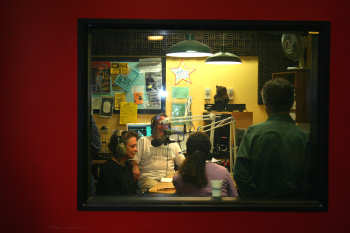
|
|
Final moments in Studio A for Kalvos & Damian
|
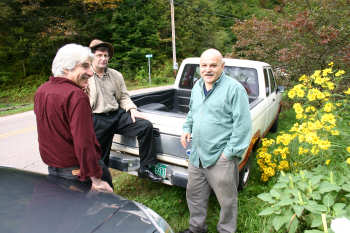
|
|
Next morning, the hayseed composers visit the Kalvos home
|
Komposer Kombat (K2) was intended as a "Survivor"-style sendup of composition competitions, which Kalvos & Damian have long derided as an absurd mismatch of imagination vs. expectation, not to mention poor pots of cash. David and I came up with the idea in the spring of 2005 as a good curtain for our show, whose end we had announced on New Year's Day.
We forwarded the idea to our board of directors. One composer objected to the nature of a 'combat', no matter how much in the Kalvos & Damian mode of informality and humor it might be, but most of the board thought going ahead was an excellent and just plain silly idea.
Development
We developed the idea just as informally, not fixing the rules -- which themselves invited being violated -- until a week before the show. Music was to be composed during a three-hour period and sent by any possible means to the WGDR studios (from which the Kalvos & Damian broadcast/webcast originates) in time for a group of judges and their evil accomplices to decide which would be finalists on the ultimate K&D broadcast on September 17, 2005. Electroacoustic and acoustic pieces would be included, probably in separate rounds.
K2 was not limited to past show guests, and announcements were sent to our mailing list and listservs of guests, potential guests, and composer supporters.
The hardest part for us -- aside from the technology, a story which follows -- was making the invitation attractive enough to engender composers who would volunteer for the mocking and abuse, but make it tough enough that composers wouldn't be able to pluck something from their repertoire and send it in as an entry. Half the K&D guests never responded (yes, our show has lost the attention of composers who have more media opportunities with the nonpop revolution well underway) and of those who did, many declined due to other commitments or the nature of the way they composed. On the other hand, composers new to us wanted to participate.
Three composers -- Mary Jane ('MJ') Leach, Alex Shapiro, and Daron Hagen -- volunteered to be the judges who would be as unfair and derisive as possible. MJ especially asked to be the 'Simon' of the group, and Alex began dangerously sharpening her wit.
Meanwhile, the ensemble started to shift. We had a string quartet and a French horn player, and then the strings departed, leaving us with the horn player who might also depart with busy child attention. But soon a delightful trio of individual musicians decided a trek to Vermont would be just the thing on a late summer weekend. The horn player didn't mind a parental break, and a singer from Vermont joined in the fray. And so the Ensemble K2 became Amanda Baker, flute; Carla Parodi, oboe; Lydia Busler-Blais, horn; Lucy Yates and Lisa Jablow, sopranos.
The ensemble was announced a few days before the show, but the rules of length were held off until the last minute.
Kalvos kept up a river of emails that eventually neared 800, and Damian had his own roiling bucket of e-words. Those composers in other time zones were given an earlier time in which to compose, provided they had their entry heading for our hands in about three hours. Some with commitments or those traveling to the show from afar were also given a time slot assigned in advance.
So we had rules and performers. Would it be a show? It was going to be tricky. Friday was set aside as electroacoustic day, and seven very short samples were uploaded. Composers had to use them to create pieces from two to four minutes long.
Day One Rounds
K&D set up in 'The Well', a library general meeting area in the remnants of the largely shuttered Goddard College. The Well was conveniently adjacent to the WGDR studios, the high-speed wireless network was up and running, and K&D brought in and tested the sound system, which was hooked directly to the computer in order to play the uploaded files immediately.
MJ was in place, but Daron Hagen was nowhere to be found; emails and phone calls in the several previous days had gone unanswered. Robert Bonotto, composer and participant in the upcoming acoustic round, was asked to take his place. Alex Shapiro was online and listening from her Malibu home. She wanted to use Skype, but we weren't ready for it by show day.
And we still had no idea what we would be getting, nor how much, nor from where. The number of submissions actually grew substantially in the last hours of the K2, not only from the U.S., but also from Canada, Argentina, Australia, Germany, the Netherlands and Peru. In the process, some almost didn't make it, and a half-dozen composers who had said they'd participate went silent.
We settled in and were joined by other listeners and composers, and the first electroacoustic round began with downloads of James Bohn's Dances -- which were seven short electronic variations called 'manifolds' -- Repeat, by BRAINGRAINHOTSPOT (Jürgen Richter/Erik Mälzner), Claudio Calmens' Atroz 1, Peggy Madden's Madtrax 1, and Rafael Junchaya's Tambok. (Kalvos spent four days looking at that last title, even thinking it might be some sort of Peruvian cultural event or musical instrument, before he realized it was simply an anagram of 'kombat'.)
Midway through listening to the Bohn Dances, we had another "Goddard Moment." Astute readers will recall that in 2001, Goddard had backed out of K&D's Ought-One Festival of NonPop seven weeks before the 35-concert festival was to take place, requiring us to relocate the entire event to downtown Montpelier, Vermont. K2 was to be a miniature version of the same experience. The Goddard board decided it didn't like the room in which it was meeting, and started noisily dragging tables and chairs into The Well, evicting us in mid-listening. It didn't matter to them that we were engaged in a time-sensitive international event; they weren't even aware of it. Goddard rudeness and ignorance never seem to end.
With the help of our patient and accomplished engineer Bert Klunder -- who goes back to the 1998 Amsterdramm days with K&D -- we moved the entire listening setup from The Well up the staircase into the meeting room the board has just vacated. The listening space was re-created-and even was improved, as we could shut the doors and block out the droning board of trustees. We recommenced with the Bohn Dances.
James Bohn had said that K&D might just choose one dance for listening, but we abdicated from that role, and left the choice to the judges who, after seven highly granular pieces nearly four minutes long each, were screaming at the speakers and throwing potato chips. The Richter/Mälzner went better (and less messily), but the Calmens also faced derision. The Madden improved the attitude in the room, as did the Junchaya.
The group broke for lunch and awaited the next round, which was joined by several composers and friends. And then ... seven more Bohn Dances appeared for the second round, as did an untitled piece by Drew Krause. Noah Creshevsky presented his Kombat in person, and next Peggy Madden's uploaded Madtrax 2 was played. Rob Voisey set up to play Bounce live (live out of his computer, that is), and online appeared Tremendo by Claudio Calmens and several tries of enigmatic x - transmission from Miriam Clinton.
Email from Miriam Clinton arrived in panic, as her MP3 converter was truncating the music at 2:22. Could we take an uncompressed file of 40MB size? Yes, we could, but not in time for the round's end. The judges listened to two-thirds of enigmatic x - transmission and agreed to hear the rest the next day if there was time.
No more files appeared in the incoming FTP directory, so the listening work ended for the day. The on-site judges talked about the pieces, and Alex Shapiro emailed her extensive, literate and often sarcastic commentaries from Malibu. We broke down the equipment and packed up. The process -- save for the Goddard Moment -- had been seamless, and the networked technology had performed flawlessly.
By day's end the first two distant performers -- flutist Amanda Baker of Janus Trio, and oboist Carla Parodi -- had arrived from Connecticut to David's home. We all met for dinner at the India House restaurant in Montpelier, where Amanda and Carla agreed that a conductor would not be needed.
Day Two Rounds
On Saturday, Studio Z was set up by Bert for the five performers, and chairs were put out for judges and guests. The musicians warmed up, and music started to arrive online in virtual heaps.
James Drew, unable to participate online, had express-mailed his New Orleans Requiem score a week earlier; unfortunately, it was written for cello, which by then was no longer available for K2. Kalvos asked James if he could arrange it for the extant ensemble, and he agreed. Kalvos had composed his Loyalcat Motet in three hours on Wednesday morning, but it was for the event and wasn't intended for judging. The alter-egoed Barry Drogin and Baruch Skeer had already finished and sent their pieces Under the Super Dome and Requiem for Kalvos & Damian because of their morning schedule conflicts.
Reena Esmail had repeatedly been trying to get a printable file through of The Backwards Composer. PDFs weren't working, and the Sibelius file kept being locked out of the so-called 'Scorch' plugin's printing option. She ended up faxing the file while we waited at the machine and ended up late at the studio, when Stevie Balch -- who doubled as photographer for the day -- came running in with a heap of faxes.
That morning, Robert Bonotto composed and duplicated his hand-inked The Life We Have in his lovely calligraphy, searching for a copy shop on a Saturday morning in Vermont. Rob Voisey brought along his pencil graphical score of 4ge, ripped from a notebook and handed to the players. And Lydia Busler-Blais carried in her pencil Uptown Train, duplicated on the back of scrap paper.
Daron Hagen had still not checked in, so with electroacoustic substitute judge Robert Bonotto a contestant in the acoustic division, Peggy Madden agreed to join the judges. And by that point, the performers decided a director was essential. Ravi Rajan, who had accompanied singer Lucy Yates on the trek from Manhattan to Vermont, was an experienced conductor and agreed to take on the job -- and carried it off brilliantly.
By then, more music had arrived. James Bohn's Trio was in, along with Gary Barwin's Psalm (dogshadows by lamplight) and Nick Didkovsky's Alex and Kowalski.
Decisions on the order of what had already been received were made collectively, and not long past noon, the first pieces were played. The Bohn Trio was up first, then a double reading of Drogin's Under the Super Dome with Lucy Yates and Lisa Jablow acting and singing. There followed a good shot at the Barwin Psalm, with excellent results from Lisa -- despite MJ's tongue-in-cheek jeering about a composer only being able to write one note for voice -- and Didkovsky's Alex and Kowalski was performed by Lucy, who received cheers for her idiomatic New York performance. MJ commented that the piece was very un-Didkovsky-like.
Meanwhile, Frank J. Oteri had sent Survivor, but like Reena's score, it was a Sibelius file with the print option turned off. Kalvos screen-captured and printed a foggy but legible copy of it as Marco Oppedisano's Farewell from Bengazegath -- a reference to one of Damian's essays -- popped out of the printer, followed by Christopher Bassett's Shenanigan No. 18. Samuel Vriezen forwarded Two Movements using emailed instruction sheets in several parts with corrections.
In a panic, Claudio Calmens emailed the studio from a cyber café that the power had failed in his part of Buenos Aires, and he was relegated to sending his long, quasi-aleatoric, and difficult Rama de Eucaliptus score desperately late -- but still in time for the round. Last of all came the score to Rafael Junchaya's Magnificat and Samuel Vriezen's final pages. Some 400 sheets were pushed out of the printer during the acoustic round.
The ensemble had in the meantime been working through The Backwards Composer, giving it several runs, followed by a performance of The Life We Have on the text by Emily Dickinson. Vriezen's Two Movements appeared unfinished, and the piece was set aside for the end of the round. The tricky Oppedisano Bengazegath followed with a restart, then came the Báthory-Kitsz Loyalcat Motet, whose harmonies were correctly picked out by MJ as Gesualdo-like -- the cat's name is Gesualdo. The pencil score gave no trouble on Busler-Blais's Uptown Train, and the James Drew New Orleans Requiem was run without its repeats.
During the performance, Ravi kept the musicians working with few flaws, and the performers themselves were at high energy throughout -- nearly to the point of oxygen-deprived giggles. In fact, they were oxygen-deprived, as the ventilation system was pumping in gas fumes. The studio was aired out, and the Baruch Skeer Requiem for Kalvos & Damian was beautifully performed, as was its complete opposite, the Christopher Bassett trio Shenanigan. Almost skipped was Rama de Eucaliptus because of its apparent length, difficulty, range and aleatoric content, but at Kalvos's insistence, it was played -- and performed well despite the perceived troubles.
Again, the contrast of Magnificat was appreciated by all around despite its conservative casting, and Junchaya's absolutely sure handling came as a surprise. The choice to do Oteri's Survivor next was something of a misjudgment, as the proto-minimalist piece did not survive the players' slow shift of mindset as well as the shortening schedule -- it was 20 minutes before air time and 35 minutes before the first acoustic piece would be heard live. Some of us had hoped for a more broadly worked Survivor, but it wasn't to be. Voisey's 4ge was elegantly done after the psychological shift that Oteri's piece offered for it.
The problem piece was Vriezen's Two Movements. Each composition had been given about seven minutes. Yet in the remaining 15 minutes -- twice the time, and even with stopwatches at the ready -- the players could not follow the layout of the emailed text score, which required that descriptive instructions be memorized before performing the material itself. By the time the composer's instructions were decoded, time had run out as the K&D opening theme rolled out on WGDR's 91.1 MHz. It was a disappointment to everyone involved, especially as the piece offered no clue as to its sound from the pages of text.
As anybody in the studio audience could tell, it was pretty wild. Reading 17 pieces in a two-hour session is a story in itself best told from inside the minds of the performers -- these were some great musicians -- and getting through previous two hours of some very assertive electroacoustic compositions had already been an intense experience for the judges and audience.
Now it was time to narrow the choices. Every piece was a good one, but some compositions were immediately and arbitrarily "voted off the island" among laughs and jeers, just to get the final on-air creations down to the required seven each. That left a lot of really good and really diverse pieces, and there were very vocal arguments for most of them. Kalvos and Damian had no official vote, and our own choices for best didn't make it into the final five. One of the judges strongly held for a piece that didn't get past the first round. Even for a competition send-up, everyone took their work seriously and -- as expected -- found it nearly impossible.
On the Air
Considering what a disaster such tech-dependent events can be, K2 had so far been almost seamless -- save for going on the air about 30 seconds behind our ability to disgorge a CD from its wrapper and get it into the player, because Studio A was filled with people standing between Kalvos and his blue bag of recordings.
Where were we? Electroacoustic pieces had all been available and played, with only Miriam Clinton's broken and recovered by the next day. 16 of the 17 acoustic pieces had been performed. And now we were on the air.
Kalvos was in Studio A, Damian 50 feet and two walls away with the performers in Studio Z. Audio feed and wireless headphones tethered them. Guests were running back and forth to be on-mic in between live performances. The finalists were chosen reluctantly because almost every piece could stand alone. But in the spirit of awarding worthless prizes, K&D insisted that choices be made. Creshevsky, Madden, Voisey, Junchaya, Richter/Mãlzner, and Krause would be finalists in electroacoustics, and Barwin, Didkovsky, Esmail, Bonotto, Busler-Blais, Drew, and Junchaya in acoustics. They were all heard on the air, along with additional electroacoustic pieces, and Barwin's and Bonotto's were done a second time to get them right.
Results were literally not ready until 10 minutes before the show's end, and the judges almost decided not to choose at all. But Komposer Kombat it would be, and Repeat by BrainGrainHotSpot (Jürgen Richter/Erik Mälzner and Kombat by Noah Creshevsky were the runner-up electroacoustic pieces, with Rob Voisey's Bounce the official winner. The acoustic results were even tighter, with Robert Bonotto's) The Life We Have and Reena Esmail's The Backwards Composer being close to Nick Didkovsky's Alex & Kowalski, the official runner-up composition (since they were required to choose! yes! choose!). The acoustic winner was Rafael Junchaya's Magnificat.
The two winners were respectively played and performed to end the show, with no long goodbyes whatsoever from Kalvos & Damian.
We enjoyed K2, as did the composers and performers. All took the work seriously -- even though they knew there were to be no real honors from the show, only the opportunity to be heard by others in the Kalvos & Damian love-for-everything respect-for-nothing format.
Dinner was had at Montpelier's The Black Door.
What We Learned
Not that we ever learn much with our hard heads, but we did find out that people take competitions very seriously, even if they're warned off that idea. But fortunately, most of the participants -- composers, performers and judges -- kept the good humor in mind. They looked for every excuse to vote compositions off the island ... and found them.
Our mistake was once again taking on too much, and if the gods of composition hadn't smiled on us, it would have been a disaster. The network was active and fast. The audio worked. The composers got their electroacoustic pieces and acoustic scores through to us -- even if Miriam had a software failure and Claudio had a power failure. The perfomers all showed up. The clinch conductor was spectacular. The microphones worked. The engineer was on top of it all. The broadcast started and ended on time. The transmitter and streams stayed active. No one broke down, freaked out, or got sick. K2 was everything we could have asked for, but the stress informed us that next time -- when we take this K2 project on the road, and yes we will -- we'll have to prepare better and be ready for emergencies.
The single greatest flaw was composers writing beyond the time allotted and resources available, considering we all knew it would be single acoustic round early in the day. Several composers wrote pieces which asked something not possible within a single daytime reading -- such as difficult-to-read layout, important missing details without which a piece couldn't work (Kalvos forgot an important senza vib on his voice lines), weak or incorrect handling of ranges that included tessituras not achievable before the evening, and most crucially, complex or missing instructions. All the pieces were expertly created, but in the stress of time, almost every composer left out aspects of a score that would have made it instantly readable and musical.
But what we learned the most is the the NonPop Revolution is so well underway that we can happily participate once again as composers ourselves.
Postscript
Since this essay was written and since the show was broadcast, Erik Mälzner contacted us to say that the entry listed as Jürgen Richter/Erik Mälzner should read instead as their (current) group name, BrainGrainHotSpot. Good enough! Done! We never know what to expect from "the boys" ... they seem to be making up a new group name with every creation these days. In our library, we not only have recordings from them, but also writings and even sculptures. We hope to meet them in person at last on October 10 in Cologne.
Also since this was written, Jürgen Richter and Erik Mälzner contacted us to say that they weren't Jürgen Richter and Erik Mälzner because they didn't want to see their names Jürgen Richter and Erik Mälzner but rather were BRAINGRAINHOTSPOT, in all caps, and that's what it must say on the listings instead of their names Jürgen Richter and Erik Mälzner, which when shown as Jürgen Richter and Erik Mälzner, they didn't want to see. Okay, boys? Done!



















